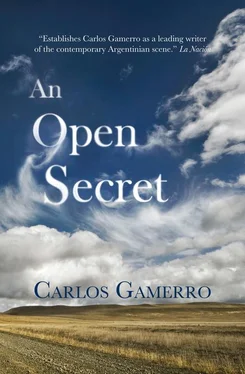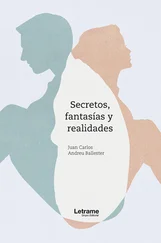I thanked him for both gestures — the gift and the sleight of hand — with a shallow nod. Right then I planned to throw the monstrous mausoleum of moral misery out of the coach window, wrapped in the little jacket Auntie Chesi had knitted for my son with her dead husband’s wool. But my determination wilted and I ended up keeping it. I told myself it might be of use in the event of legal problems, that I’d keep it in the trunk room at home, in a double-seal bag (you only had to glance at the cover to sink into a profound depression for the rest of your day) and would give it to my lawyer as a keepsake; but to be honest, in the end it was a kind of reverence that stopped me getting rid of it. The extraordinary folder documented not only the dark side of the multiple existences batting about without rhyme or reason in this patch of the gringo pampas that’s so like any other it reminds you of the samples carried by travelling fabric salesmen; but also something more precious — the sterile sacrifice of a life that, rather than moving somewhere, had chosen to bury itself in this place in order to hate it the more. Professor Gagliardi’s soul had given itself to the most insidious and perhaps illicit of the passions known to man — cringing embarrassment at others (which is not to say he neglected his own; I’d be lying by omission if I forgot to mention File № 827, corresponding to Gagliardi, Benjamín F). This hefty tome, this promiscuous cohabitation of police dossier and small-town gossip, was also the melancholy testament to a life devoted to moral mortification.
“A COUPLE OF KILOMETRES out of town down the Fuguet road there’s a place on your left with the branches of a ceiba sticking out of a little patch of young willows. That’s the best place to stop because the hard shoulder’s wider, then you walk a few metres till you see a little footpath branching off that’s been worn by people walking through the weeds. Follow it till you come to a wire fence,” Ña Agripina the healer had told me, and following her instructions I find the place easily. There’s a girl there, kneeling, and she barely raises her head to glance at me over her shoulder before bowing it again. On the other side of the wire fence stretches a garbage dump, whose muddy ground is shared peacefully by some pigs and numerous mud-bellied gulls, and, at the far end of it, a shack shaded by Persian lilacs, where generations of Villalbas have been returning their legendary past drop by drop to the common anonymity of the poor. There Ezcurra’s body at least found a brief respite in the earth, a siesta rather than a sleep, his temporary grave. Beneath that mud he slept, until he was unearthed by the parents and grandparents (I don’t know how to measure the generations of pigs) of the ones now nosing around the garbage tip.
On the near side, by the wire fence, partly serving as a framework and support, stands a mixed conglomeration, which I can’t find a simple word for. At the centre of the group stands a stick cross, bound with strips of black inner tube, which also hold two bunches of anonymous dried flowers in an X that divides the cross into eight acute angles. Intertwined at this intersection hangs a rosary of little red balls, its plastic cross resting on one of the lower legs of the X of flowers. Most of the ones surrounding the base are plastic, opaque and brittle from years of exposure to the elements, peeping out of little baskets, the cloth or crêpe paper ones faded to watery green, pale pink and light blue. The natural flowers droop and dissolve into a vegetal impasto — making it impossible to tell them apart — over vases of topless mineral-water bottles: and here and there, strewn across the ground, small succulents have managed to take root and grow in the artificial shade of the others. Emerging from the neck of a half-litre Coca-Cola bottle half-full of clear water wave the heads of a bunch of yellow daisies, upright in the wind, rearranged now and then by my current companion. From the wires taut with the cold, hang the most varied assortment of ornaments, as if from a little Christmas tree: purple-flowered air plants, plenty of them; two plastic babies, one with no arms, the other with no legs; a light-blue baby’s dummy, a knotted silk handkerchief, which would fall apart like ash when touched; charms representing hearts, legs and arms; a key on its key ring; a burnt-out light bulb. Due to the proverbial absence of pebbles or flint in the region, the candles are mounted on improvised supports, some still recognisable as bits of tile or brick, rust-eaten tin cans, jars, a beer bottle embedded in concrete; others invisible beneath successive layers of different-coloured wax.
The image is nailed onto the larger stick of the cross and wrapped in cellophane, which has protected it to an extent from the rain, but not from the ravages of the sun. It’s a reproduction of an old master, with every look of having been torn out of a calendar, showing a young woman, seated, covered by an old pink dress and ample blue drapery over her knees; she wears her hair loose and her big Spanish eyes stare straight out at the observer. The naked child standing on her lap must be at least one, and stares out with the same dark eyes; a barely perceptible luminescence surrounds his curls, which are the same chestnut-brown as his mother’s, who holds him with one hand — her left — under his buttocks, her right hand steadying him just above his navel. The left hand of the child, who has no need to hold on, rests on her right arm; his right seems to reach instinctively for his mother’s breast. There’s nothing else in the picture; in the dark background you can just make out the edge of a relief on which she’s sitting.
The girl gets up and, glancing at me as if to say your turn, gets ready to leave.
“Why are you here?” I ask her.
“I flunked six subjects at school señor and came to ask them for help in my exams coming up.”
“Why them?”
“They’re very miraculous,” she answers me.
I stay there for a while, sitting on the grass in the sunshine, but can’t think of anything to ask them for. I get up to go, leaving no other offering than a butt stubbed out in one of the puddles of melted wax.
“YOUR FATHER WAS A BRAVE MAN,” Professor Gagliardi comes out with at one point, I don’t remember the context. “He fought for what he believed to be just, for a better society, for the rights of the least fortunate, at the expense of his own interests and the risk of his life, which he eventually laid down. He fought against mediocrity and hypocrisy, and they never forgave him for it. When I realised there was another young man amongst us willing to move heaven and earth for the sake of the truth, I knew in my heart it could only be his son. Seeing you confirmed it. You’re as brave as he was. Your father would be proud of you.”
I thank him for his words — or at least the intention they reveal — because I feel incapable of saying what I really think — that none of it’s true. The professor’s cloistered idealism was trying to make a hero out of an involuntary martyr, but the truth is that, in those days, in identical or worse circumstances, thousands and thousands of people had shown more bravery or dignity than this father of mine. And I, his worthy son, had sat at the table with those who betrayed him, concealing my identity and his, denying him, as he denied me, until the cock crowed itself hoarse; disguising with growing obstinacy my relationship with the man in the scarlet swimming trunks, so that, in a lost town I may never return to in my life, people whose opinion I care little about wouldn’t feel uncomfortable when they spoke to me about him.
The professor does so now. But he seems different. For the first time there’s something that looks like a smile on his face, perhaps the first beneficial effect of ridding himself of the fearsome marbled folder. He has another one in his lap — large, lined with faded spiderweb paper, open. It’s a photo album, from Malihuel High School, and the picture in question is of a far more erect and hirsute Professor Gagliardi, who’s now smiling openly, and under his insistently tapping index finger is the roguish gaze and rebellious quiff of a lad looking astonishingly like photos of me as a teenager, pace that ineffable period flavour. Towards the lower right corner a little girl, whose features leave me blank, holds a slate with white plastic letters, saying Eva Perón Fiscal School № 16. Malihuel. First Grade, 1955 .
Читать дальше












